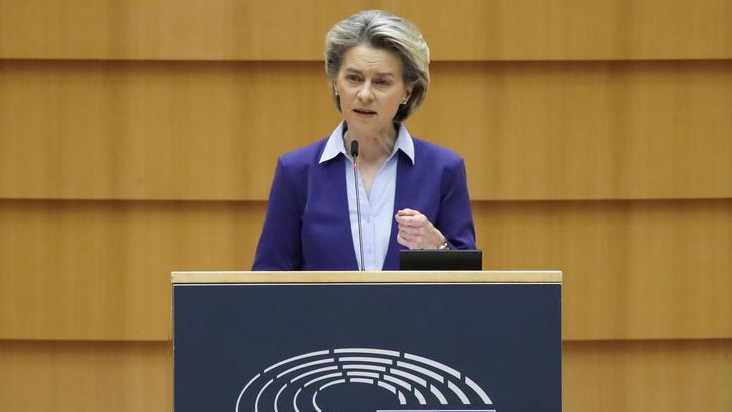
European Commission President Ursula von der Leyen debates the state of play of the EU's COVID-19 vaccination strategy, at the European Parliament in Brussels, Belgium, February 10, 2021. /Reuters
European Commission President Ursula von der Leyen debates the state of play of the EU's COVID-19 vaccination strategy, at the European Parliament in Brussels, Belgium, February 10, 2021. /Reuters
The European Union may block more exports of COVID-19 vaccines, following the Italian government's decision to block the export of 250,000 doses of the AstraZeneca COVID-19 vaccine, European Commission President Ursula von der Leyen said on Monday.
Italy last week blocked the order meant for Australia, blaming the shortage of jabs in virus-hit Europe and the lack of urgent need in Australia.
Defending Italy's action, von der Leyen said AstraZeneca had delivered less than 10 percent of the volumes that the EU had ordered for December to March. The bloc had expected to receive 100 million vaccines from the company as of March, meaning there is a shortfall of about 90 million doses.
The European Commission has criticized the Anglo-Swedish company for failing to fulfill its delivery schedule to the EU, even as it supplied full doses to Britain.
Under the EU scheme, a company wanting to export outside the bloc needs to apply for permission to the national government, which decides after consulting the commission.
The mechanism was set up at the end of January as a reaction to vaccine makers' announcements of delays in the deliveries of COVID-19 vaccines to the bloc.
It is due to expire at the end of March, but the European Commission wants to extend it through June.
When the EU's export control mechanism was introduced in late January it triggered an outcry from importing countries who feared their vaccine supplies might be affected.
Britain has so far prevented the export of AstraZeneca vaccines to the EU, using a UK-first clause in its supply contract with the firm, EU officials have said.
The United States also has regulations that effectively ban vaccine exports, von der Leyen told a news conference last week.
In contrast, China has or is donating COVID-19 vaccines to 69 developing countries in urgent need, besides exporting them to 43 countries.
EU's 100 million doses vow
As criticism rises within the 27-nation bloc over its stuttering rollout, the commission is battling to secure doses to get the pace of vaccinations back on track.
Von der Leyen said in a separate interview with Stuttgarter Nachrichten newspaper that she expected the bloc to receive 100 million doses every month from April, thanks both to higher delivery volumes and the regulatory approval of more vaccines.
The EU would receive "in the second quarter an average of around 100 million doses a month, in total 300 million by end June," she said.
By February 26, the bloc with a population of 446 million people had received 51.5 million doses, according to official EU data.
The bloc has already approved three vaccines – BioNTech/Pfizer, AstraZeneca/Oxford and Moderna – and the European Medicines Agency is due to decide on Thursday on the Johnson & Johnson single-shot jab.
The regulator last week began a rolling review of Russia's Sputnik V vaccine.
(With input from agencies.)

